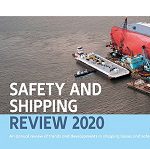
Number of smaller shipping incidents on the rise
While total losses continue to see a positive trend, the number of reported shipping incidents (2,815) increased by 5% year-on-year, driven by machinery damage, which caused over one in three incidents (1,044). A rise in incidents in the waters of the British Isles, North Sea, English Channel and Bay of Biscay (605), meant it replaced the East Mediterranean as the top hotspot for the first time since 2011, accounting for one in five incidents worldwide.
“We cannot lose sight of the fact that, while total losses have reduced significantly, the total number of incidents increased year-on-year,” says Ossena. “It does not take much for a serious incident to result in a total loss and, hence, the warning signs are there.”
There were almost 200 reported fires on vessels over the past year, up 13%, with five total losses in 2019 alone. Mis-declared cargo is a major cause. Taking steps to address this issue is vital as it will only worsen as vessels become bigger and the range of goods transported grows. Chemicals and batteries are increasingly shipped in containers and pose a serious fire risk if they are mis-declared or wrongly stowed.
Geopolitical tensions and cyber impact shipping safety
Meanwhile, events in the Gulf of Oman and the South China Sea show political rivalries are increasingly being played out on the high seas and shipping will continue to be drawn into geopolitical disputes. Heightened political risk and unrest globally has implications for shipping, such as the ability to secure crews and access ports safely. In addition, piracy remains a major threat with the Gulf of Guinea re-emerging as the global hotspot, Latin America seeing armed robbery increase and renewed activity in the Singapore Strait.
Ship-owners are also increasingly concerned about the prospect of cyber-conflicts. There has been a growing number of GPS spoofing attacks on ships, particularly in the Middle East and China, while there have been reports of a 400% increase in attempted cyber-attacks on the maritime sector since the coronavirus outbreak.
Other risk topics in the AGCS Safety & Shipping Review include:
- Targets to cut emissions will shape shipping risk for years to come. The aim to halve CO2 emissions by 2050 will require the industry to radically change fuels, engine technology and even vessel design. Since January 1, 2020 allowable sulphur levels in marine fuel oil were slashed. However, compliance is not straightforward and teething problems could lead to a surge in machinery damage claims. Ultimately, decarbonisation will also have regulatory, operational and reputational implications. Progress on addressing climate change could stall with the focus on the coronavirus pandemic. This must not be allowed to happen.
- New technology not a panacea, but an increasingly useful tool: Shipping tech can be a positive for safety and claims and is increasingly being deployed to combat some of the risks highlighted in the report – from reducing the threat of fire on vessels through temperature monitoring of cargo to even potentially integrating suppression systems in drones in future. Increased use of industrial control systems to monitor and maintain engines could significantly reduce machinery damage and breakdown incidents, one of the biggest causes of claims.
- Unluckiest ships – The most accident-prone vessels of the last year were two Greek Island ferries and a bulk carrier in North America, all involved in six different incidents.
